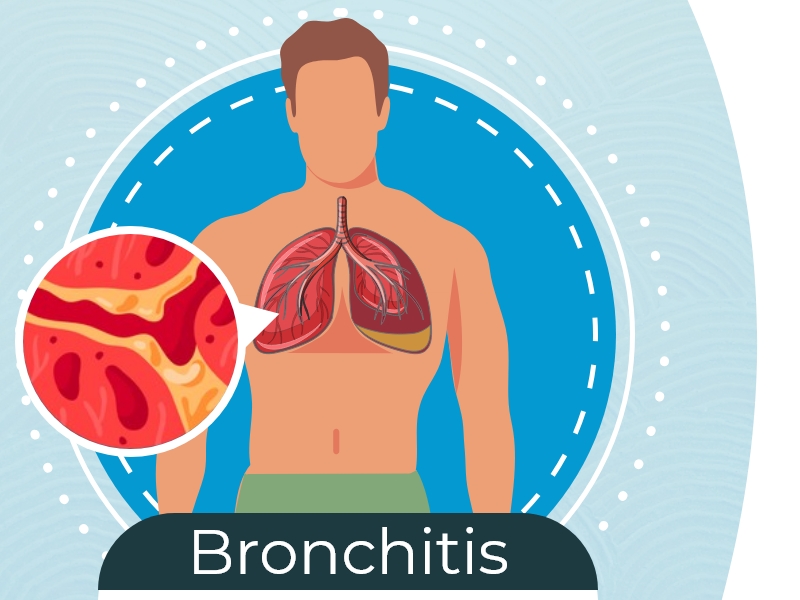Bronchitis

Bronchitis is an infection of the main airways of the lungs which becomes inflamed and irritated. Most cases of this infection occur when an infection irritates and inflames the airways that cause them to make more mucus than usual. Bronchitis can be defined as being either acute or chronic bronchitis.
- Acute bronchitis is common in winter and often comes on after common flu, sore throat, or cold. This affects mostly children under the age of 5 which lasts up to 3 weeks.
- Chronic bronchitis affects adults over 40 years old. This is a daily productive cough due to smoking. For this reason, you must stop smoking if you have bronchitis.
What Causes Bronchitis?
Bronchitis can be caused by bacteria or viruses. In most cases, this infection is caused by the same virus that causes flu or the common cold. Bronchitis can also be triggered by breathing in irritant substances such as chemicals in household products, smog, or tobacco smoke. Smoking can be the main cause of chronic bronchitis that may affect people who inhale second-hand smoke and smokers themselves.
Signs and Symptoms of Bronchitis
- A blocked nose and sinuses
- Headache
- Breathlessness
- Body aches
- Sore throat
- Feeling of tightness in the chest
- Low fever and chills
- Wheezing
- A persistent cough that produces mucus
Risk Factors of Having Bronchitis
The following are the risk factors that increase your risk of having bronchitis:
- Exposure to irritants on the job
If you are exposed to chemical fumes or work around certain lung irritants like textiles or grains your risk of developing bronchitis is greater.
- Cigarette smoke
Persons who smoke or who are living with a smoker have a higher risk of developing acute and chronic bronchitis.
- Low resistance
This may cause a chronic illness that compromises your immune system or from another acute illness such as a cold. Infants and young children, as well as older adults, have a greater susceptibility to infection.
- Gastric reflux
Repeated attacks of severe heartburn can irritate your throat and make you more likely to develop bronchitis.
Safety Precautions
- Wash your hands: To lessen your risk of having a viral infection, wash your hands often and get into a habit of using alcohol-based hand sanitizers.
- Avoid cigarettes: Cigarette smoke increases your risk of chronic bronchitis.
- Get vaccinated: Several cases of acute bronchitis can be caused by a virus. Getting a yearly flu vaccine helps be protected from getting the flu. You can also consider getting a vaccination that protects against some type of pneumonia.
- Wear a surgical mask: If you have bronchitis, consider wearing face masks if being exposed to fumes or dust. You may also consider wearing it when you are going to be among crowds especially when traveling.
Treating Bronchitis
There is no specific cure for bronchitis but some lifestyle changes can help ease your symptoms such as:
- Regular moderate exercise
- Avoiding smoking
- Eating a healthy diet
In most cases, acute bronchitis clears up by itself within a few weeks without the need for treatment. In the meantime, you need to drink lots of fluid and get plenty of rest.
If you developed chronic bronchitis, you might benefit from pulmonary therapy. It is a breathing exercise program wherein a respiratory analyst demonstrates to you how to breathe more without difficulty. It also helps you to increase your capability to exercise.
Medications for Bronchitis
Most circumstances of bronchitis are caused by viral infections, antibiotics are not effective. Conversely, if you are suspected to have bacterial infections, your doctor may prescribe you a dose of antibiotic. In some cases, your doctor may recommend other medicines such as:
- Cough medicine
- If you have allergies, COPD, or asthma, your doctor may recommend an inhaler and other medications to open narrowed passages in your lungs and lessen inflammation.



